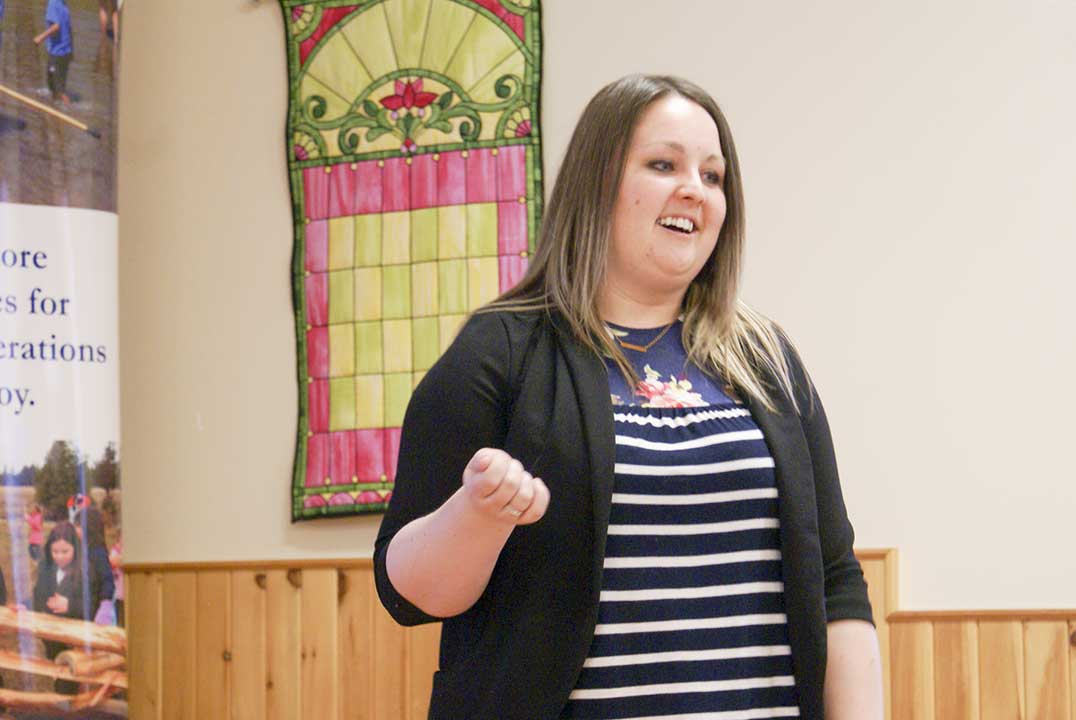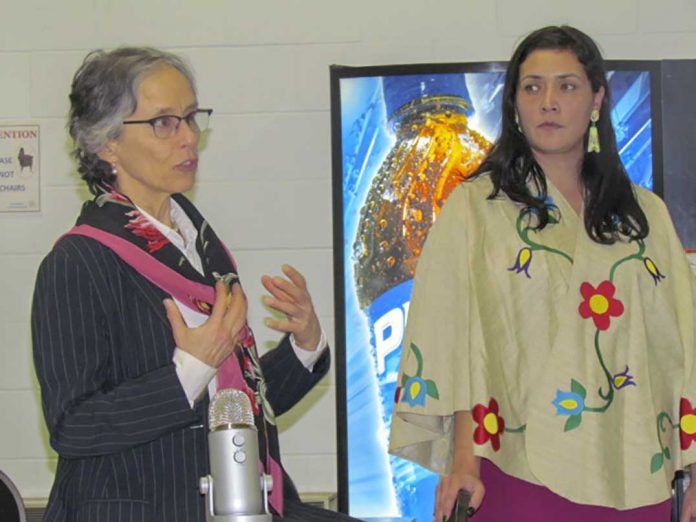Manitoulin Streams encourages Island residents to consider legacy program
SHEGUIANDAH––It is a tribute to Manitoulin Streams executive director Seija Deschenes and her tireless enthusiasm and commitment to restoring Manitoulin’s waterways that on one spring day, Howland Seniors’ Hall in Sheguiandah was packed with people interested in learning about Manitoulin Streams’ legacy program. Other speakers on hand were lawyer Janelle Proulx, talking about wills and estates, and Louise Duke, a senior financial planner with TD Canada Trust since 1989, who talked about planned giving.
Manitoulin Streams works to improve water quality and create better habitats for fish such as salmon and brook trout. Most people don’t realize how much work goes into stream clean-up, explained Ms. Deschenes. “A lot of the projects that take place cost $80-90,000 to complete. For a lot of the restoration work we do we hire local businesses such as contractors and we purchase local materials. We plant a lot of trees and utilize local nurseries.”
Environmentally friendly materials are used whenever possible. As an example, on shoreline restoration projects they use coco-core matting instead of black landscape fabric. After the shoreline is graded, grass seed is sprinkled over the matting, which breaks down and becomes part of the soil in about three years time.
In 2017 Manitoulin Streams planted 3,153 trees while working with several different classes at Central Manitoulin Public School and including a community tree planting in Wiikwemkoong. They have worked with researchers at Laurentian University on pre- and post-assessments to see if there are changes over time, obtaining baseline information that can be utilized down the road for climate change adaptation. College Boreal has worked with Manitoulin Streams to gather baseline data on various species, including invasive species.
“We involve school groups,” explained Ms. Deschenes. “They gain ownership by helping out. We are creating that kind of healthy environment for our youth on the Island.”
Last year the association employed two full-time employees, one First Nation stewardship liaison intern (supported through Northern Ontario Heritage Fund Corporation), one community resource steward liaison (funded through Canada Summer Jobs program), one invasive species awareness liaison (through Ontario Federation of Anglers and Hunters), and one person on a contract basis. They also worked with Cambrian College to support an environmental engineer co-op position. “We are trying to create jobs and to create economic stimulus through stream clean-up,” said Ms. Deschenes
Since 2003 the Manitoulin Streams Improvement Association has raised over $4.6 million, all of which has gone back into Island communities. Funding comes from a variety of sources. Funding for the organization comes from local businesses and federal or provincial government sources, but they also receive a lot of in-kind support, which is highly valued. “Some years we’re successful, some not,” said Ms. Deschenes. “It’s part of the game as a not-for-profit. We’re always trying to find funds to support our projects.”

Enter the legacy program. It’s a way of obtaining funding so that the association can better plan for the future. “We’re looking at ways we can over time capture some funds through donations so we can continue to do the work we’re doing,” Ms. Deschenes said.
Planned giving is a gift that is arranged now to provide funds to an organization of your choice at some time in the future. The gift comes from your assets (not your income) and has certain tax advantages. It does require some type of legal documentation such as a will.
According to TD Canada Trust, approximately only one-half of adult Canadians have a valid will in place. “Even the simplest will can be a daunting task,” acknowledged Janelle Proulx, a Mindemoya-based lawyer who specializes in real estate and wills and estates. “It can be the best thing you can do.”
People assume that everything will go to their spouse and/or children upon their death but it’s not that simple, explained Ms. Proulx. “A will is helpful for the people who are left behind. There is a formula under the law for the distribution of assets but someone would have to apply through the court to be appointed as an executor should a loved one pass away without a will.” She encouraged attendees to ensure they had a legal will in place, and to keep it simple rather than complicated for easier updating.
Most people, when considering beneficiaries, think about their spouse, their children or grandchildren. “You can also name a cause or charity as beneficiary,” Ms. Proulx said. “It can be a sum of money or the proceeds of an investment.”
For those who would like to bequest something to a favourite cause but don’t know how or how much, “you don’t have to leave a dollar amount,” she said. “It can be a percentage. Another option is to leave your estate to a charity as an alternative.
It’s helpful to talk to a lawyer who can explain your options.
If your property is co-owned, a lawyer can explain the difference between joint tenants and tenants-in-common. Shared bank accounts can be equally tricky. “A will is important,” Ms. Proulx continued. “There are newer clauses in wills where you can leave your estate ‘per capita’ which means each recipient receives a share per capita but if they are pre-deceased the other heirs get a larger share. ‘Per sterpes’ means if you leave all or part of your estate to one person and they have passed away it will go to their children or heirs.”
“Leaving a gift for your favourite cause is another really great thing to do. I’ve enjoyed hearing about the activities of Manitoulin Streams. This is what we love about Manitoulin, to live in a natural and amazing place.”
Louise Duke of TD Canada Trust spoke about probate and tax considerations to think about for gifts and estate planning. “Things have changed considerably,” she warned. “In the past people have added someone to their bank accounts or property titles as a way of avoiding probate courts. If you own property, there will be probate.”
There are two major issues to consider when estate planning: tax planning and avoiding probate. “One strategy,” Ms. Duke offered, “is to make a charitable donation of up to 100 percent of your income in the year of death.” You can also name that charity on a Tax-Free Savings Account (TFSA) to avoid probate.” Probate costs can be high. They are a half percent on the first $50,000 and 1.5 percent on anything over that.
You also need to consider Retirement Savings Plans (RSP) and Retirement Income Fund (RIF) plans that become 100 percent income in the year of death, and also capital gains on property. “Another issue that we’re running into,” she explained, “is property and stocks that were purchased years ago. We’ve found that children have had to sell things just to pay capital gains.”
That’s where charitable donations can come into play. “You can name Manitoulin Streams, with all the great things they are doing on the Island, as beneficiaries ahead of time – reducing capital gains, probate and taxation,” said Ms. Duke. “You can actually donate shares to a charity and avoid any capital gains at all as shares are transferred at book value.”
“There are several ways you can make donations to avoid that taxation,” she continued. “Things are complicated. Wording is important. It has to be a registered charity,” she said. “We’re very lucky in Canada that we do pay taxes and have a pretty good life, but there are ways to minimize those taxes.”
Children can be added as joint account holders or homeowners but the risks can be large and anything valued over $1,000 must be probated. Ms. Duke recommended naming your spouses as successor holders and your children as beneficiaries on TFSAs and RIFs. She noted that charities can be named as beneficiaries under life insurance policies, which can also be a taxable benefit if the charity is named as beneficiary at time of purchase, and cautioned people to make sure they have the charity’s full correct name. She also recommended speaking to a lawyer.
Manitoulin Streams volunteer treasurer, Therese Trainor, was the initiator of the legacy program. “In order to complete our financial plan we needed to implement a legacy program,” she explained. “We work hard to obtain funding. We host dinners and other events. This program is beneficial to many seniors on the Island and to Manitoulin Streams. We want to educate islanders on the tax savings they may experience as part of their estate plan. It’s win-win.”





